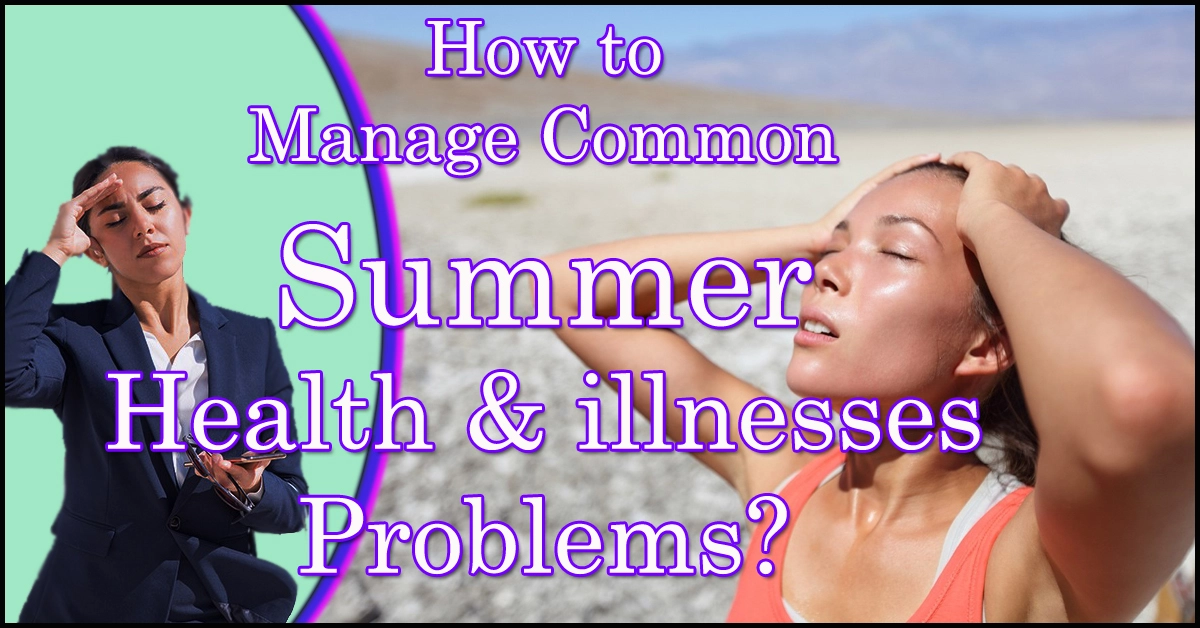
Summer Health
Summer is a time of year that many people look forward to, with its warm weather, longer days, and opportunities for outdoor activities. However, with summer also come a variety of problems and illnesses that can impact our health and wellbeing. From sunburns to insect bites to dehydration, there are many potential hazards to be aware of during the summer months. By taking the necessary precautions and knowing how to prevent and manage these issues. We can enjoy all that summer has to offer while keeping ourselves safe and healthy.
Summer & Sunburn
Sunburn is a common problem that many people experience during the summer months, especially when spending extended periods of time outdoors. When the skin is subjected to excessive ultraviolet (UV) radiation from the sun or other sources. Such as tanning beds, sunburns develop. Symptoms of sunburn typically include red, tender skin that may feel warm to the touch, and can include pain, itching, and blistering in more severe cases.
Sunburn can be prevented by taking a few simple steps. Such as wearing protective clothing and hats, seeking shade during the hottest parts of the day, and applying sunscreen with Every exposed skin should have an SPF (sun protection factor) of at least 30. It’s important to apply sunscreen liberally and reapply every two hours, especially after swimming or sweating.
If you do get sunburned, there are several things you can do to alleviate symptoms and promote healing. Cool compresses, aloe vera gel, and over-the-counter pain relievers can help to soothe the skin and reduce pain and inflammation. Drinking plenty of water can also help to rehydrate the skin and prevent further damage.
In severe cases, sunburn can require medical attention. Seek medical care if you experience blistering, fever, or chills, or if the sunburn covers a large area of your body. By taking the necessary precautions and treating sunburn properly, you can protect your skin and enjoy the summer season safely.
Heatstroke in summer
Heatstroke is a serious medical condition that can occur when the body’s temperature regulation system is overwhelmed by prolonged exposure to high temperatures and humidity. It is a medical emergency that can lead to organ damage or even death if left untreated.
Symptoms of heatstroke include a body temperature of 104°F (40°C) or higher, a rapid pulse, rapid breathing, confusion, agitation, slurred speech, seizures, and loss of consciousness. It’s important to seek emergency medical attention immediately if you or someone you know is experiencing these symptoms.
Preventing heatstroke involves taking steps to stay cool and hydrated in hot weather. This includes wearing loose-fitting, lightweight clothing, staying in air-conditioned environments or shade, drinking plenty of water, and avoiding alcohol and caffeine which can cause dehydration. It’s also important to take frequent breaks and rest when engaging in physical activity in hot weather.
If you suspect that someone is experiencing heatstroke, move them to a cooler area immediately and call for emergency medical services. While waiting for medical help to arrive, remove any excess clothing, apply cool water to the skin, and fan the individual to promote cooling.
In summary, heatstroke is a serious medical condition that requires prompt medical attention. By taking preventive measures and recognizing the symptoms of heatstroke, you can help to protect yourself and others from this potentially life-threatening condition.
Dehydration
Dehydration occurs when the body loses more fluids than it takes in. Leading to a lack of water and essential electrolytes in the body. It can happen any time of the year but is more common during the summer months due to higher temperatures and increased physical activity.
Symptoms of dehydration can range from mild to severe and include thirst, dry mouth, fatigue, dizziness, headache, dark urine, and muscle cramps. In severe cases, dehydration can cause confusion, rapid heartbeat, sunken eyes, and even seizures.
It’s crucial to consume enough of water and other fluids throughout the day to avoid dehydration. Avoiding alcohol and caffeinated drinks, which can contribute to dehydration, is also recommended. Consuming meals containing a lot of water, including fruits and vegetables, can also be beneficial.
If you do become dehydrated, it’s important to take steps to rehydrate the body. Drinking water or sports drinks that contain electrolytes can help to replenish lost fluids and minerals. Resting in a cool, shaded area and using a cool compress can also help to alleviate symptoms.
In severe cases of dehydration, medical treatment may be necessary, such as intravenous fluids or electrolyte replacement therapy.
In summary, dehydration can be a serious condition, especially during the summer months. By staying hydrated and recognizing the symptoms of dehydration, you can help to prevent this condition and maintain optimal health and wellbeing.
Allergies
Summer is a season of allergies for many people, particularly those who suffer from seasonal allergies like hay fever. Allergies occur when the immune system overreacts to substances in the environment such as pollen, mold, and dust. Symptoms of seasonal allergies can include sneezing, runny or stuffy nose, itchy or watery eyes, and scratchy throat.
To prevent allergies, it’s important to avoid exposure to allergens as much as possible. Keep windows and doors closed during high pollen count days, use air conditioning and air purifiers, and avoid outdoor activities during peak pollen times, usually early morning or evening. Wearing sunglasses and a hat can also help to reduce pollen exposure to the eyes and face.
Over-the-counter antihistamines, decongestants, and nasal sprays can help to alleviate allergy symptoms. In some cases, allergy shots or immunotherapy may be recommended by a doctor to help the body build up a tolerance to allergens.
If you experience severe symptoms such as difficulty breathing, rapid heartbeat, or swelling of the face or throat, seek emergency medical attention immediately.
In summary, allergies can be a common problem during the summer months. By taking steps to avoid exposure to allergens and managing symptoms with medication or other treatments, you can enjoy the season without being bothered by seasonal allergies.
Food poisoning
Food poisoning is a common problem during the summer months, particularly when people eat outdoors or consume foods that have not been stored properly. It occurs when food is contaminated with harmful bacteria, viruses, parasites, or toxins. Leading to gastrointestinal symptoms such as nausea, vomiting, diarrhea, and stomach cramps.
To prevent food poisoning, it’s important to follow basic food safety guidelines. This includes washing hands frequently and thoroughly, cooking meat and poultry to the appropriate temperature, refrigerating leftovers promptly, and avoiding cross-contamination by keeping raw and cooked foods separate.
When eating outdoors, it’s important to keep perishable foods at the appropriate temperature. Use insulated coolers with plenty of ice or ice packs to keep food below 40°F (4°C). Avoid leaving food out in the sun or in temperatures above 90°F (32°C) for more than one hour, or more than two hours if temperatures are below 90°F (32°C).
If you suspect that you have food poisoning, it’s important to stay hydrated by drinking plenty of fluids. In most cases, the symptoms will resolve within a few days. However, if symptoms are severe or do not improve, seek medical attention.
In summary, food poisoning can be a serious problem during the summer months. But it can be prevented by following basic food safety guidelines. By taking steps to ensure that food is handled, stored, and prepared properly, you can help to protect yourself and others from foodborne illness.
Bites and stings by insects Summer
Insect bites and stings are common during the summer months, particularly when spending time outdoors. Mosquitoes, bees, wasps, and ticks are just a few of the many insects that can bite or sting, leading to symptoms such as itching, redness, swelling, and pain.
To prevent insect bites and stings, it’s important to wear protective clothing such as long sleeves and pants, and use insect repellents that contain DEET, picaridin, or other EPA-approved ingredients. Avoid wearing bright colors or strong fragrances, which can attract insects.
If you do get bitten or stung, remove the stinger if present and clean the affected area with soap and water. Applying a cold compress or a topical antihistamine can help to alleviate symptoms. For more severe symptoms such as difficulty breathing, swelling of the face or throat, or a rapid heartbeat, seek medical attention immediately.
Ticks are a particular concern during the summer months, as they can transmit Lyme disease and other illnesses. To prevent tick bites, wear protective clothing and use insect repellents that contain 20% or more DEET. After spending time outdoors, check your body for ticks, paying particular attention to areas such as the scalp, behind the ears, and under the arms.
In summary, insect bites and stings can be an annoying and sometimes dangerous problem during the summer months. By taking steps to prevent bites and stings and knowing how to treat them when they occur. You can enjoy the season without being bothered by pesky insects.
Swimmer’s ear
Swimmer’s ear is an infection of the outer ear canal that can occur when water becomes trapped in the ear after swimming or other water activities. The moisture provides a breeding ground for bacteria. Leading to symptoms such as pain, itching, redness, and discharge from the ear.
To prevent swimmer’s ear, it’s important to keep ears as dry as possible after swimming. This can be done by using earplugs or a swim cap. Tilting the head to the side to allow water to drain out of the ear, and using a towel or hair dryer on the lowest setting to dry the outer ear.
If you do develop swimmer’s ear, over-the-counter ear drops containing acetic acid or alcohol can help to alleviate symptoms. In some cases, a doctor may prescribe antibiotics if the infection is severe or does not improve with at-home treatments.
In addition to swimmer’s ear, other ear problems can occur during the summer months, particularly in children. Ear infections can be caused by a buildup of fluid in the middle ear. Leading to symptoms such as ear pain, fever, and difficulty hearing. To prevent ear infections, it’s important to practice good hygiene, avoid exposure to secondhand smoke, and seek prompt treatment for colds and other respiratory infections.
In summary, swimmer’s ear and other ear problems can be a common problem during the summer months, particularly for those who spend a lot of time in the water. By taking steps to prevent and treat these conditions, you can enjoy water activities without being bothered by ear problems.
Also Read – Spices Benefits and medicinal properties
Poison ivy, oak, and sumac
Poison ivy, oak, and sumac are plants that contain a resin called urushiol. Which can cause an allergic reaction in many people. Exposure to these plants can lead to symptoms such as itching, redness, and blisters on the skin.
To prevent exposure to poison ivy, oak, and sumac, it’s important to learn to recognize these plants and avoid touching them. The leaves of poison ivy and oak often have a distinctive “three-leaf” pattern. While poison sumac has clusters of leaves with a stem that has 7-13 leaves.
If you do come into contact with poison ivy, oak, or sumac, wash the affected area with soap and water as soon as possible to remove the urushiol resin. Over-the-counter treatments such as calamine lotion or hydrocortisone cream can help to alleviate itching and discomfort.
In more severe cases, a doctor may prescribe oral or topical corticosteroids to reduce inflammation and alleviate symptoms. If symptoms are particularly severe, such as difficulty breathing or swelling of the face or throat, seek medical attention immediately.
In summary, poison ivy, oak, and sumac can be an annoying and sometimes painful problem during the summer months. By learning to recognize these plants and taking steps to prevent exposure. You can avoid the uncomfortable symptoms that can occur as a result of contact with these plants.
Traveler’s diarrhea
Traveler’s diarrhea is a common problem that can occur when traveling to areas with poor sanitation or contaminated food and water. Symptoms of traveler’s diarrhea include diarrhea, stomach cramps, and sometimes fever and vomiting.
To prevent traveler’s diarrhea, it’s important to practice good hygiene. Such as washing hands frequently with soap and water, and avoiding contact with potentially contaminated surfaces. When traveling to areas with poor sanitation. It’s important to only drink bottled or boiled water and to avoid eating raw or undercooked foods.
If you do develop traveler’s diarrhea, it’s important to stay hydrated by drinking plenty of fluids. Such as water, clear broths, or sports drinks. Over-the-counter medications such as loperamide (Imodium) can help to alleviate symptoms. But should not be used for more than two days without medical supervision.
In more severe cases of traveler’s diarrhea, antibiotics may be prescribed by a doctor. It’s important to seek medical attention if symptoms persist for more than a few days. If there is blood in the stool, or if there are signs of dehydration, for instance, reduced urine production or dry mouth.
In summary, traveler’s diarrhea can be an unpleasant and sometimes serious problem when traveling to areas with poor sanitation. By taking steps to prevent infection and knowing how to treat symptoms when they occur. You can enjoy your travels without being sidelined by traveler’s diarrhea.
The season of summer & Heat rash
Heat rash, also known as prickly heat or miliaria, is a skin condition that occurs when sweat ducts become blocked and sweat is trapped under the skin. This can lead to small red or pink bumps on the skin, often accompanied by itching or a prickling sensation.
Heat rash typically occurs in areas of the body where skin touches skin. Such as the neck, underarms, groin, or in skin folds. It can be prevented by staying cool and dry in hot and humid weather. Avoiding tight clothing, and taking frequent breaks from physical activity.
To treat heat rash, it’s important to first move to a cooler. Less humid environment to allow the skin to cool and dry. Loose-fitting, breathable clothing can also help to alleviate symptoms. Over-the-counter lotions or creams containing calamine or hydrocortisone can help to soothe itching and irritation.
In more severe cases of heat rash, a doctor may prescribe a topical cream or ointment to reduce inflammation and alleviate symptoms. It’s important to seek medical attention if the rash becomes infected or if symptoms do not improve with at-home treatments.
In summary, heat rash can be an uncomfortable and annoying problem during the summer months. By taking steps to prevent heat rash and knowing how to treat symptoms when they occur. You can enjoy outdoor activities without being bothered by this skin condition.
Conclusion
In conclusion, summer can be a wonderful time of year. But it also brings with it a variety of potential health problems and illnesses. From Sunburn and Heatstroke to Dehydration, Allergies, food Poisoning, insect bites and stings, swimmer’s ear, poison ivy, Traveler’s Diarrhea, and heat rash, there are many conditions to be aware of and take steps to prevent or treat.
By practicing good hygiene, staying Hydrated, wearing Protective clothing and Sunscreen, Avoiding contact with allergens and insects, and knowing how to recognize and treat common summer health problems. You can enjoy the season while Minimizing your risk of illness or injury. If you do experience symptoms or are unsure how to prevent or treat a particular condition. It’s important to seek medical attention from a Healthcare professional.
Disclaimer: The information on this website is provided for informational reasons and is not meant to be personal medical advice. You should consult your doctor or another Qualified fitness professional if you have any concerns about a Systemic condition. Never Disregard professional medical advice or give up looking for it because of something you read on this website. The Daddydontblog.com does not promote or recommend any products.






You actually make it appear really easy along with your
presentation but I in finding this topic to be actually one
thing which I feel I would never understand.
It sort of feels too complicated and very
wide for me. I am taking a look ahead to your
subsequent submit, I’ll try to get the hang of it! Lista escape roomów